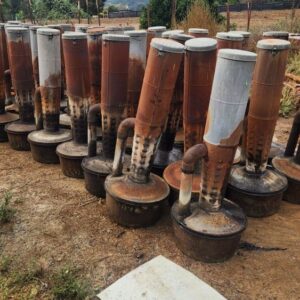Prostate enlargement is something that happens to many men as they get older. Some men don’t even realize it at first. Others notice that they go to the bathroom more frequently or have trouble initiating urination. It can be uncomfortable and affect daily life.
But there’s good news: You can do a lot to help your prostate stay healthy—naturally. In this article, we’ll explain everything in simple words. You’ll learn what the prostate is, why it grows, and how to protect it using food, exercise, and other natural methods.
What Is the Prostate?
The prostate is a small gland in the body of a man. It’s about the size of a walnut. It sits below the bladder and surrounds the urethra, which is the tube that carries urine from the bladder out of the body.
The prostate helps make part of the fluid in semen. So it’s important for male fertility. But after a man turns 40 or 50, the prostate often starts to grow.

What Happens When the Prostate Gets Bigger?
When the prostate grows, it can press against the urethra. That makes it harder for urine to pass. This condition is called BPH, which stands for Benign Prostatic Hyperplasia. It’s not cancer. But it can cause unpleasant symptoms.
Common signs include:
- Needing to pee a lot, even at night
- Trouble starting or stopping the urine stream
- Weak flow of urine
- Feeling like the bladder is not empty
- A sudden urge to urinate
In some men, these symptoms are light. In others, they can become serious and impact sleep, work, and overall well-being.
Why Does the Prostate Enlarge?
Doctors aren’t 100% sure why this happens. But there are some likely causes:
1. Aging
As men get older, their hormone levels change. This is the main reason why the prostate tends to grow.
2. Hormone Changes
Men produce less testosterone as they age. But a form of testosterone called DHT (dihydrotestosterone) stays high. DHT makes the prostate cells grow.
3. Estrogen Balance
Men also have a small amount of estrogen. As testosterone goes down, estrogen becomes more active. That may also affect prostate growth.
4. Family History
If your father, grandfather, or brother had an enlarged prostate, you are more likely to get it too.
5. Lifestyle
A diet high in fat and processed food, too much sitting, and lack of physical activity also make BPH more likely.

Is It Dangerous?
Prostate enlargement is not cancer. But it can make daily life harder.
If it gets too bad, it can cause:
- Bladder infections
- Bladder stones
- Kidney damage (rare, but possible)
- Complete blockage of urine (emergency)
That’s why it’s smart to take care of your prostate early and naturally.
How to Prevent Prostate Enlargement – Naturally
Let’s go through the best natural ways to protect your prostate and feel better.
1. Eat Healthy Foods
What you eat has a huge effect on your body. Some foods support prostate health. Others make symptoms worse.
Foods That Help:
- 🍅 Tomatoes – rich in lycopene, a powerful antioxidant
- 🥦 Broccoli, cabbage, and kale – contain compounds that fight cell damage
- 🍓 Berries – full of vitamin C and antioxidants
- 🐟 Fatty fish – like salmon or sardines, have omega-3 fats
- 🎃 Pumpkin seeds – high in zinc
- 🍵 Green tea – helps reduce inflammation
Foods to Avoid or Reduce:
- Red meat
- Fried or fatty foods
- Sugary snacks
- Too much dairy
- Processed meats (like hot dogs or bacon)
A good rule: eat more colors from plants and less food from boxes or fast food places.
2. Drink Enough—but Not Too Much at Night
Water is very important for health. But if you drink too much in the evening, you’ll wake up at night to pee.
Tips:
- Drink more water in the morning and afternoon
- After 7 PM, drink less
- Avoid coffee, soda, and alcohol late in the day – they irritate the bladder
3. Move Your Body Every Day
Exercise helps your whole body—including your prostate.
Benefits:
- Helps control weight
- Balances hormones
- Improves blood flow
- Lowers stress
You don’t need to go to a gym. Just walk, stretch, ride a bike, or swim for 20–30 minutes most days.
Even gardening or dancing counts!
4. Keep a Healthy Weight
Men who are overweight are more likely to have BPH.
Fat tissue produces extra estrogen and lowers testosterone. That’s bad for prostate health.
Small Steps Help:
- Eat slower
- Cut down on sugar drinks
- Walk more
- Avoid late-night snacks
5. Manage Stress
Long-term stress affects your hormones and can make symptoms worse.
Easy ways to relax:
- Deep breathing
- Meditation
- Nature walks
- Listening to music
- Gentle stretching or yoga
Try to sleep 7–8 hours per night. Poor sleep also raises stress.
6. Don’t Sit Too Long
Sitting too much—especially on hard chairs—puts pressure on the pelvic area.
- Stand up every 30–60 minutes
- Walk around the room
- Use a cushion
- Try a standing desk sometimes
7. Use Natural Supplements (with Caution)
Some herbs and plants may help reduce prostate symptoms. But always ask your doctor first.
Common ones:
- 🌿 Saw Palmetto – may lower pressure on the urethra
- 🌰 Beta-sitosterol – helps with urine flow
- 🌳 Pygeum – from African tree bark, may ease symptoms
- 🌿 Nettle root – used in Europe for prostate health
These supplements are not magic, but some men find them helpful.
8. Try Kegel Exercises
Kegels help strengthen your pelvic muscles. This gives you better control when you urinate.
How to do them:
- Tighten the muscles you use to stop pee
- Hold for 5 seconds
- Relax
- Do 10–15 times, 3 times a day
It’s easy and you can do it anywhere—no one will notice.
9. Get Regular Checkups
Some prostate problems can be silent. That’s why it’s smart to see a doctor, especially after age 40.
Tests your doctor may suggest:
- PSA test – a blood test for prostate activity
- Digital Rectal Exam (DRE) – the doctor feels your prostate with a gloved finger
Catching problems early means easier treatment.
Warning Signs – Don’t Ignore
Go to a doctor right away if you notice:
- Blood in urine
- Strong pain when urinating
- Can’t pee at all
- Fever and chills (with pee problems)
These may be signs of prostatitis or prostate cancer—not just BPH.
Common Myths
Let’s clear up some misunderstandings:
🔸 Myth: BPH is cancer
✅ Truth: It’s not cancer. But both affect the prostate, so symptoms can be similar.
🔸 Myth: Only very old men get it
✅ Truth: It can start at 40, and by 60, many men have it.
🔸 Myth: Sex is bad for the prostate
✅ Truth: Regular ejaculation may help reduce swelling.
Summary – What Can You Do?
✅ Eat healthy, plant-rich food
✅ Move every day
✅ Drink wisely
✅ Sleep well
✅ Avoid long sitting
✅ Try natural herbs (with the doctor’s OK)
✅ Do Kegels
✅ Stay calm and manage stress
✅ Get regular checkups
Taking care of your prostate doesn’t need to be hard. A few small changes can make a big difference in how you feel now—and as you age.






